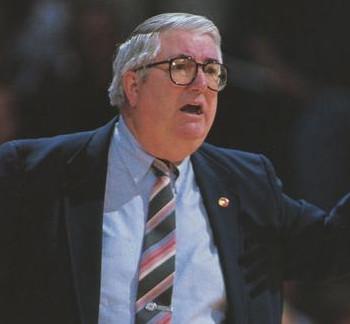Frank Layden, the beloved former coach and general manager of the Utah Jazz, has passed away at the age of 93, ESPN reports. Known for his charismatic leadership and significant contributions to the franchise’s rise in the NBA, Layden’s legacy extends beyond his winning record to his impact on the team and fans alike. His death marks the end of an era for Utah basketball and the broader basketball community.
Frank Layden Leaves Lasting Legacy with Utah Jazz Success and Humble Leadership
Frank Layden’s impact on the Utah Jazz transcended wins and losses. Serving as both coach and general manager during the 1980s, Layden guided the franchise through one of its most formative eras, laying the foundation for future success. Under his leadership, the Jazz became renowned not just for their competitive play but for a culture imbued with humility, respect, and camaraderie. His ability to connect with players and foster a positive locker room environment helped mold stars like Karl Malone and John Stockton into all-time greats.
Beyond the hardwood, Layden’s humble approach to leadership left an indelible mark on the NBA community. His combination of sharp basketball acumen and genuine warmth earned him respect league-wide. Key highlights of his tenure include:
- NBA Coach of the Year (1984): Acknowledging his leadership in turning the Jazz into playoff contenders.
- Mentorship: Developing young talent and promoting teamwork over individual accolades.
- Executive Acumen: Building a sustainable team framework that boosted Utah’s reputation.
| Role | Tenure | Notable Achievement |
|---|---|---|
| Head Coach | 1979-1988 | NBA Coach of the Year (1984) |
| General Manager | 1986-1988 | Drafted key players shaping Jazz’s future |
| Team President | Post-1988 | Oversaw transition alongside Jerry Sloan |
Inside Layden’s Coaching Philosophy and Impact on Modern Basketball
Frank Layden’s approach to coaching was rooted in a rare blend of humor, humility, and an uncanny ability to connect with players on a personal level. He prioritized building a family-like atmosphere within the Utah Jazz organization, emphasizing trust and open communication above all else. This philosophy not only elevated team chemistry but also allowed individual talents to flourish in a collective environment. Layden’s knack for reading the locker room and adjusting strategies accordingly was a hallmark of his tenure, making him one of the most respected figures in NBA circles during his era.
His impact on modern basketball extends beyond wins and losses, influencing coaching styles and player management to this day. Key tenets of his philosophy included:
- Empathy and player empowerment: Encouraging athletes to take ownership of their roles while feeling supported.
- Adaptability: Tailoring game plans to maximize the strengths of the roster instead of imposing rigid systems.
- Injecting levity: Using humor as a tool to ease pressure and foster resilience during high-stakes situations.
| Coaching Element | Layden’s Approach | Modern Influence |
|---|---|---|
| Team Culture | Inclusive, family-like | Emulated by leading NBA franchises |
| Player Relations | Empathy and humor | Standard for effective leadership |
| Game Strategy | Flexible, player-centric | Blueprint for adaptive coaching |
Lessons from Frank Layden’s Career for Aspiring Coaches and Team Executives
Frank Layden’s career offers invaluable insights for those aiming to leave a mark as coaches or executives in professional sports. His ability to balance humor with leadership created a unique team culture that prioritized both performance and player well-being. Layden demonstrated that success isn’t just built on strategy and tactics but also on fostering strong relationships and maintaining a positive locker room atmosphere. Moreover, his adaptability in transitioning from coach to general manager exemplifies the importance of versatile skill sets and a willingness to embrace new challenges within an organization.
His legacy also underscores key principles that aspiring leaders can adopt:
- Prioritize Communication: Layden was known for his approachable demeanor and open dialogue with players and staff, reinforcing trust and cohesion.
- Embrace Humor: Using wit and lightheartedness, he reduced pressure on the team, inspiring creativity and resilience.
- Adapt Quickly: Transitioning roles mid-career, he showed how agility in leadership positions can sustain longevity and impact.
- Focus on Development: Layden valued player growth beyond statistics, emphasizing personal and professional improvements.
| Quality | Layden’s Approach | Takeaway for Coaches & Execs |
|---|---|---|
| Leadership Style | Humor-infused and empathetic | Create an environment where players feel supported |
| Career Flexibility | Coach to GM transition | Be open to evolving roles for greater organizational impact |
| Communication | Clear and approachable | Maintain transparency and build trust |
| Player Development | Focus on holistic growth | Value character as much as skill |
Wrapping Up
Frank Layden’s legacy as a beloved coach and executive of the Utah Jazz remains deeply ingrained in the fabric of the franchise and the broader NBA community. His contributions on and off the court helped shape the team’s identity during a pivotal era. As the basketball world mourns his passing at age 93, Layden’s impact will be remembered by fans, players, and colleagues alike.














